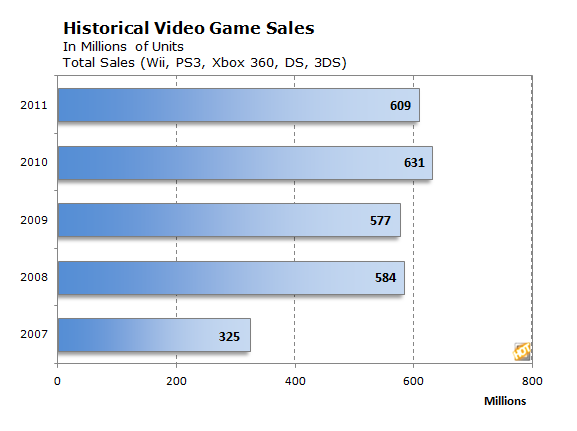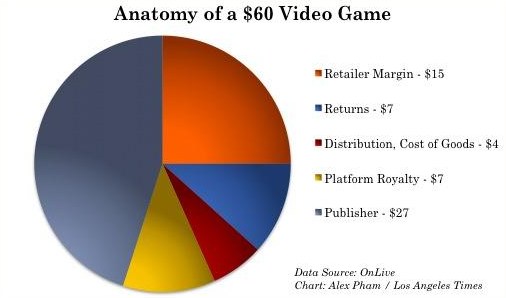If You Resell Your Used Games, The Terrorists Win (original) (raw)
Game designer Richard Browne has come out swinging in favor of the rumored antipiracy features in the next-gen PlayStation Orbis and Xbox Durango. "The real cost of used games is the damage that is being wrought on the creativity and variety of games available to the consumer," Browne writes. "The real cost of used games is the death of single player gaming."
Browne's comments echo those of influential programmer and Raspberry Pi developer David Braben, who wrote last month that "pre-owned has really killed core games... It's killing single player games in particular, because they will get pre-owned, and it means your day one sales are it, making them super high risk. I mean, the idea of a game selling out used to be a good thing, but nowadays, those people who buy it on day one may well finish it and return it."
According to both men, studios implement things like DLC, DRM, and multiplayer in an attempt to reduce game churn. This reduces the resources available to the single-player teams, while spiraling costs drive midrange developers out of business. It's at this point that Browne's Crazy Pill really kicks into overdrive. He writes: "If used game trading fueled new game sales then when used game trade-ins became the new standard a few years ago new games sales should have spiked. Of course they didn't; in fact game sales have stayed mostly flat or actually declined."
Here's total software sales for the Xbox 360, PS3, Wii, DS, 3DS, PSP, and PC, as measured by VGChartz.

The 3% decline in retail sales from 2010 to 2011 was Nintendo's fault. Demand for Wii and DS titles fell 26 and 33% respectively; PS3 and Xbox 360 sales increased by 13% and 16% over the same period. The idea that game sales have "stayed flat or actually declined" since the beginning of this console generation is absolutely ludicrous. The downturn in sales thus far in 2012 reflects the Wii's dwindling popularity and the relative age of the Xbox 360 and PS3, as well as the fact that 2011 sales were quite strong during the same period.
Both Browne and Braben conflate hating GameStop (a thoroughly reasonable life choice) with the supposed evils of the used games market. Braben goes so far as to claim that used games are actually responsible for high game prices and that "prices would have come down long ago if the industry was getting a share of the resells." Amazingly, no game publishers have stepped forward to publicly pledge themselves to lower game prices in exchange for a cut of used game sales.

Publishers are hammering Gamestop (and recruiting developers to do the same) because it's easier than admitting that the current system is fundamentally broken. As things stood in 2010, nearly 50% of a title's $60 MSRP went to publishers and for console royalties. Meanwhile, developers like Browne complain that spiraling development costs make it nearly impossible for games to get made -- neatly ignoring the fact that a tiny fraction of titles are responsible for carrying the costs of developing expensive failures.
It's easier to blame Gamestop than to admit that the mythical man month doesn't work, that pushing employees to work weeks of overtime is directly counterproductive, or that an awful lot of video games should never be made in the first place. The game developers calling for a share of used market profits are advocating the death of First Sale doctrine in the name of perpetuating a doomed business model.

If that cost curve holds true for 8th generation titles, no squabbling over used game sales is going to patch the problem. To put the issue in perspective, consider Gamespot's 2010 financial information.

Original breakdown / graph published here.
In 2010, Gamestop did 2.46Bin"usedvideogamesalesandotherproducts."Let′scallthat2.46B in "used video game sales and other products." Let's call that 2.46Bin"usedvideogamesalesandotherproducts."Let′scallthat2.5B and further assume that every single used sale can be translated into a full-priced revenue sale for the publisher. Total game sales in the US for 2010 was 10BaccordingtoNPD−−whichmeansthatevenifGameStopgaveall10B according to NPD--which means that even if GameStop gave all 10BaccordingtoNPD−−whichmeansthatevenifGameStopgaveall2.5B right back to publishers, it's not enough to matter long term.
Don't let even a thoroughly rational dislike for bottom-feeders like Gamestop blind you to the bigger issue on this one. Killing the used game market wouldn't bring down prices. It wouldn't solve the problem of too few good games carrying the responsibility of paying for an ocean of crap -- and it would require consumers to give up their right to sell property they previously purchased or agree to digital-only distribution systems with draconian lockdown methods. We respect folks like David Braben, who have worked both as game developers and in the production of the Raspberry Pi, but in this case, the blame is landing on the wrong people.